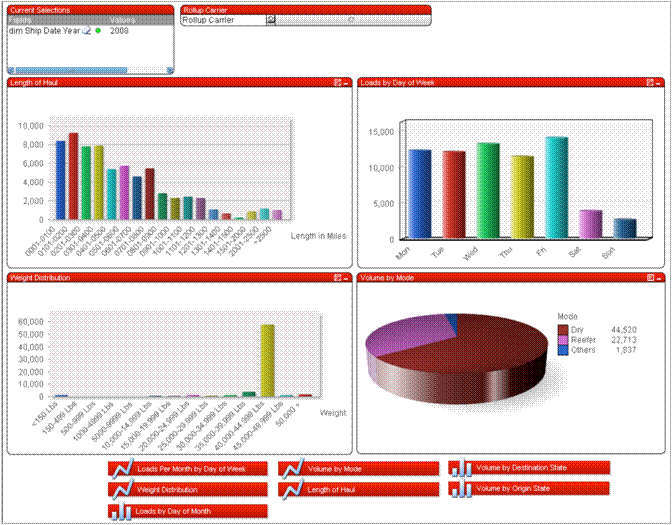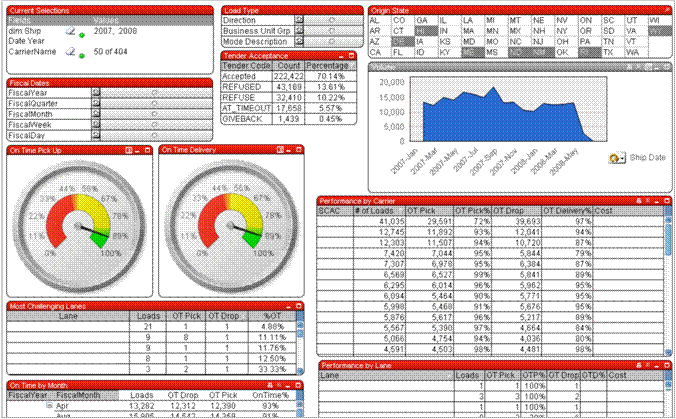C.H. Robinson’s Secret Weapon: The Transportation Management Center
Chicago, Illinois USA
July 9, 2008
By
Evan Armstrong
Key Personnel:
Chris O’Brien, Vice President, CHRW
Jordan Kass, Director, TMC Services
Jim de Vries, Director of Operational Excellence
Chris Brady, Manager of Operational Excellence
Glenn Koepke, General Manager – Chicago, TMC
Tyler White, General Manager – Minneapolis, TMC
Transportation Management Center Overview
Headquartered in Chicago the Transportation Management Center (TMC), a division of C.H. Robinson Worldwide, has roots extending back to Robinson’s purchase of American Backhaulers in 1999. The TMC has quietly grown to become Robinson’s primary lead logistics manager (LLM) solution for customers looking for an integrated, transparent and carrier neutral transportation management approach. Today it has over 130 employees and $1.15 billion in freight under management. Its offices are in Chicago and Minneapolis and it will be opening an Amsterdam office in the fourth quarter of 2008.
The TMC focuses on working with large shippers in developing optimal transportation networks through its consulting, modeling, and lean six-sigma approach, and then utilizes its personnel and IT for daily transportation planning, management, and continuous performance improvement. If the customer chooses, the TMC can bring the full bear of Robinson’s freight brokerage and international freight forwarding capabilities, but does so in a customer directed fashion versus a single-source third-party logistics (3PL) model. Most TMC customers are using a mix of their own contract carriers and often retain control of their carrier relationships and rate negotiations. Key customers include: Coca-Cola, John Deere, Ocean Spray, and Tetra Pak.
TMC Online Business Intelligence Tools
TMC utilizes Infor/CAPS for transportation planning and an extensive suite of proprietary software to manage customers’ daily transportation optimization and execution operations. One of the most impressive parts of its integrated transportation management systems is the proprietary, TMC developed, online business intelligence tools. Written in .Net and supported by an enterprise data warehouse, the online business intelligence tools provide shippers with leading edge information for process improvement and transportation cost reduction initiatives.
As the “screen shot” below shows, on one screen a shipper can see all of its transportation network information including: the number of shipments by length of haul, loads tendered to carriers by the day of the week, shipment weight distributions, and load volumes by carrier mode.
Figure 1, Network Profile View

The following screen provides ad-hoc summaries based upon user defined parameters such as analysis timeframe, carrier modes, individual lanes, shipment volumes, and other key areas of analysis. It details on-time pickup and delivery and individual carrier performance metrics against defined service level benchmarks.
Figure 2, Transportation Executive Summary View

Overall the system provides a good deal of functionality and well presented “actionable” information. One customer using the TMC online tools is John Deere. Its inbound transportation improvement history with the TMC is detailed in the case study below.
John Deere Inbound Transportation Management Case Study
Prior to 2007, John Deere’s inbound transportation was being managed by its suppliers. Because John Deere works with several thousand suppliers, it was experiencing higher costs and inconsistencies within its inbound supply chain network. After joint meetings and an initial analysis, the TMC identified an opportunity for additional savings from developing an inbound transportation management program. The following objectives were created in collaboration with John Deere:
- Transition all inbound freight from a supplier-managed to a TMC/John Deere-managed operation.
- Develop metrics to drive carrier routing compliance.
- Determine the overall potential cost savings opportunities and create benchmarks.
- Deploy a transportation management systems solution to optimize transportation.
- Perform a transportation network analysis.
- Provide John Deere with recommendations for reducing its inbound transportation spend.
From the objectives above, the TMC worked with John Deere in establishing a centralized transportation management center. Its focus was to oversee the centralized management and execution of John Deere’s domestic transportation strategy and provide support services including: network analysis, transportation modeling, a pool point program, and TMS implementation.
Beginning in Phase One of establishing the John Deere centralized TMC operation, four primary steps were outlined:
- Perform a transportation network data analysis and evaluation based on:
- North American inbound materials shipments.
- Service parts shipments to John Deere distribution centers.
- c. Returnable container shipments back to suppliers.
- Determine the scope of the project based upon the data analysis.
- Develop inbound transportation management scenarios and strategies.
- Make inbound transportation optimization recommendations to John Deere.
After the data analysis was performed, the TMC presented its findings to John Deere and recommended an inbound solution that included transportation management systems deployment, developing a cross-docking/pool point network, utilizing dedicated fleets, constructing multi-stop truckloads, and performing less-than-truckload consolidations.
Once John Deere and TMC had agreed on a solution, steps were taken to streamline all inbound transportation processes and establish a new inbound operating model. Based on the solution, the TMC and John Deere:
- Defined and implemented a transportation procurement strategy.
- Defined and managed a project plan-based implementation.
- Developed and implemented a vendor carrier routing compliance management program.
- Defined the necessary metrics and benchmarks for analysis and process improvements.
The next step was to deploy the TMC transportation management system and integrate it into the new inbound model. As of third quarter 2007, all of John Deere’s inbound freight transactions were operating on the TMC transportation management systems platform. The TMC optimizes inbound transportation as follows:
- Suppliers enter their shipment data into the TMC online system.
- The TMC filters the shipment data to facilitate order and mode optimization.
- Optimized shipments are created and tendered to John Deere’s inbound carriers.
- The TMC business intelligence tools are utilized to monitor the process and report results.
The results from Phase One have been an overall reduction in transportation costs through the use of planning and optimization tools, implementation of streamlined processes, increased order visibility, and improved service levels from the development and implementation of performance metrics across the John Deere supplier base.
John Deere and TMC are continuing to align resources, analyze the new inbound optimization model, and remain dedicated to continuous process improvements. Phase Two of the overall project has been started and includes: continuing to execute and analyze the deployed inbound optimization model and to determine the appropriate thresholds needed to expand the model beyond the initial phase. John Deere and the TMC mutually share the goals which determine the success of John Deere’s transportation management operations and are currently making ongoing process improvements and finding ways to reap additional transportation cost savings.
Summary
While it has been “flying under the radar” within the large C.H. Robinson Worldwide operating network, the TMC provides a unique offering to support lead logistics manager operations. We definitely see this approach meeting the needs of large shippers needing network transportation management with top-notch IT support. When the TMC adds international capabilities, the solution will add additional appeal to multi-nationals managing global supply chains. The TMC is a good solution for a shipper looking to outsource its transportation network or upgrade its transportation management processes.
Sources: A&A Primary Research, http://www.chrobinson.com/


